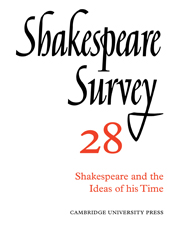Book contents
- Frontmatter
- ‘Richard II’ and the Realities of Power
- The Politics of Corruption in Shakespeare’s England
- Literature without Philosophy: ‘Antony and Cleopatra’
- Self-consciousness in Montaigne and Shakespeare
- ‘Measure for Measure’: The Bed-trick
- Shakespeare and the Doctrine of the Unity of Time
- ‘Coriolanus’ and the Body Politic
- ‘Titus Andronicus’, iii, i, 298–9
- ‘The Merchant of Venice’ and the Pattern of Romantic Comedy
- The Integrity of ‘Measure for Measure’
- ‘To Say One’: An Essay on ‘Hamlet’
- ‘The Tempest’ and King James’s ‘Daemonologie’
- Sight-lines in a Conjectural Reconstruction of an Elizabethan Playhouse
- The Smallest Season: The Royal Shakespeare Company at Stratford in 1974
- The Year's Contributions to Shakespearian Study 1 Critical Studies
- 2 Shakespeare’s Life, Times, and Stage
- 3 Textual Studies
- Index
- Plate section
2 - Shakespeare’s Life, Times, and Stage
Published online by Cambridge University Press: 28 March 2007
- Frontmatter
- ‘Richard II’ and the Realities of Power
- The Politics of Corruption in Shakespeare’s England
- Literature without Philosophy: ‘Antony and Cleopatra’
- Self-consciousness in Montaigne and Shakespeare
- ‘Measure for Measure’: The Bed-trick
- Shakespeare and the Doctrine of the Unity of Time
- ‘Coriolanus’ and the Body Politic
- ‘Titus Andronicus’, iii, i, 298–9
- ‘The Merchant of Venice’ and the Pattern of Romantic Comedy
- The Integrity of ‘Measure for Measure’
- ‘To Say One’: An Essay on ‘Hamlet’
- ‘The Tempest’ and King James’s ‘Daemonologie’
- Sight-lines in a Conjectural Reconstruction of an Elizabethan Playhouse
- The Smallest Season: The Royal Shakespeare Company at Stratford in 1974
- The Year's Contributions to Shakespearian Study 1 Critical Studies
- 2 Shakespeare’s Life, Times, and Stage
- 3 Textual Studies
- Index
- Plate section
Summary
Literary scholarship is not an exact science, and there are few occasions on which a scholarly argument is so powerfully set out that we cannot possibly refuse assent to it. But this does not mean that all arguments are equally valid, and one of the most valuable qualities of a good scholar is a strongly developed awareness of the difference between provable fact, reasonable hypothesis, and mere speculation. These remarks are prompted by two book-length studies of aspects of Shakespeare’s life, both written by academics, which seem to the present reviewer to be seriously lacking in balanced judgement.
The first of these is W. Nicholas Knight'sS hakespeare’s Hidden Life: Shakespeare at the Law 1585-1959). The aim of Knight's book is to prove that Shakespeare was a lawyer's scribe during the late 1580s and early 1590s, and that he had a deep personal interest in the administration and reform of the law. Knight looks first at the legal troubles which overtook Shakespeare's father from 1577 onwards and which caused the loss of property Shakespeare might have expected to inherit from his mother. Then Knight discusses what he considers to be an authentic Shakespeare signature in a law-book by William Lambarde now in the Folger Shakespeare Library. He concludes with a consideration of Shakespeare's legal attitudes as exhibited in his plays and in his will.
- Type
- Chapter
- Information
- Shakespeare Survey , pp. 164 - 173Publisher: Cambridge University PressPrint publication year: 1975

